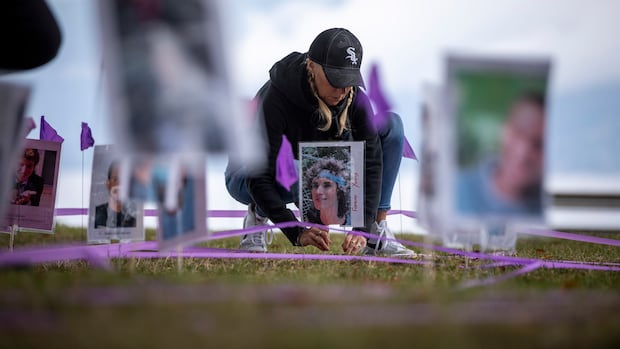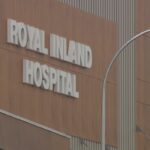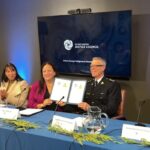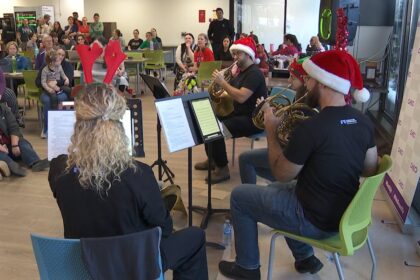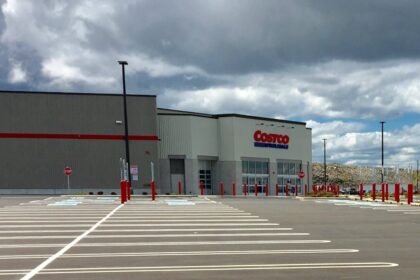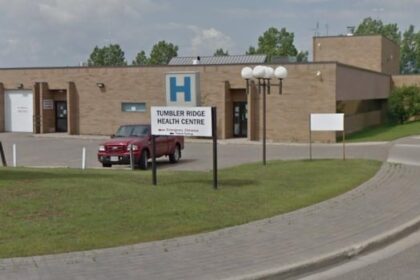British ColumbiaDrug fatalities have shot up in the small city of Campbell River, which for years has topped the lists of the highest drug deaths per capita in B.C. Frontline workers and users there say they need more services and resources to cope. Users and advocates say the city is a hub for northern Vancouver Island and needs more servicesGeorgie Smyth · CBC News · Posted: Oct 16, 2025 8:00 AM EDT | Last Updated: 3 hours agoChantal Costaz’s son Santos is pictured during a memorial on International Overdose Awareness Day in Vancouver on Aug. 31, 2023. (Ben Nelms/CBC)Locals agree there were already too many people dying on the streets of Campbell River, B.C., before 13 people recently overdosed in the space of six and a half weeks. The number is staggering for the small Vancouver Island city, where about 35,000 people live about 220 kilometres northwest of Victoria. It pushed the local RCMP detachment to issue a rare warning this month about what they suspect to be a batch of particularly toxic drugs in the community. For users, their family, friends and public health workers, the fatalities are felt deeply in the little networks people maintain there to look out for each other. “I knew all of them, we knew them all, they’re our friends,” said Anne–Marie Levac, a Campbell River resident who uses crack cocaine.The 13 deaths dramatically break an overall pattern of declining overdose numbers in the province — a trend that’s been observed across Canada and in the United States since the end of 2024. The latest numbers from the B.C. Coroners Service show 21 people have died in Campbell River so far this year, through to the end of August. The spike since Sept. 1 brings that up to 34. More services for people with an addiction could make the difference in bringing numbers down, says Dr. Jacquie Erikson, a family doctor who works in addictions medicine in Campbell River and visits other northern Vancouver Island towns.Hub cityGeography is one of the factors that contributes to the city’s higher rates of drug use with many users from other communities migrating south for the services that Campbell River has, says Erikson. Some find toxic supply there before they find help. Dr. Jacquie Erickson says a loss of drug services has hurt their small community in Campbell River, B.C., and there are not enough options for people wanting to detox. (Andrew Lee/CBC)A harm reduction kiosk, safe injection and smoking site and a warming centre are among what Erikson calls “connection pieces” the city has lost recently. “I really worry people are out using alone in like tents, in like the forest, and overdosing and dying in that way, so I think the loss of services has really hurt our population.” It’ll be some time before the B.C. Coroners Service, which is investigating the September deaths, can point to exactly what killed those 13 people, but the RCMP says regardless of what investigators come back with, the poisonous supply and persistent random dangerous ingredients are concerning. WATCH | Campbell River residents say the local drug crisis is out of control:RCMP warns public after slate of overdose deaths in Campbell RiverCampbell River RCMP issued a rare public warning this month after 11 suspected deaths occurred in the area during a five-week span. Overdose deaths had dipped earlier in 2025 in B.C. but toxic supply continues to devastate especially in the small Vancouver Island community.As with elsewhere in B.C., fentanyl has been the biggest driver of the overdoses.Campbell River does have two locations a few streets away from each other for users to access harm reduction services and drug testing. But if people want to be supported and stop using all together, the nearest detox centre is in Nanaimo, a 150-kilometre drive south.As for supplying more housing, the city and province say 48 new units have come online in Campbell River since the end of last year for people who have been sleeping outside or in shelters in the city for at least two years. However, statistics from the B.C. Coroners Service show that most people who are killed by toxic drugs in B.C. die in private residences. Which is why, for Chantal Costaz, mental health and the toxic supply itself are the top problems to solve when it comes to keeping people alive. Costaz watched her 20-year-old son Santos struggle with addiction on the streets of Campbell River. Chantal Costaz lost her 20-year-old son Santos in 2022 to an overdose in Campbell River, B.C., despite ‘trying her hardest’ to get him into treatment. (Andrew Lee/CBC)The drugs “softened everything in his brain” she says, before they killed him in 2022. She tried everything to get him into treatment, she says.”These people wouldn’t be dead if it weren’t for the toxic drug supply,” she said. Santos was offered a bed at a facility in Richmond, just outside Vancouver, but Costaz coudn’t get him there in time.Santos died a few days later.”You’d like to think that your son’s death had some impact and would start changing things,” she said.Costaz says she honours her son by collecting and donating food and clothes to users living on the street in Campbell River. She says she’s just one of many people in the community who do what they can to fill gaps they see in the drug crisis there.But she says this recent spike felt like a reminder that something is dramatically failing. “It all brought it back to me again, like how many more mothers?”ABOUT THE AUTHORGeorgie Smyth is a CBC Network Reporter and Producer in Vancouver. She’s worked for BBC World News in London and for Nine News in Australia. She’s focused on local, national and international stories that affect all Canadians. Got an idea or story tip? Email: georgina.smyth@cbc.ca Follow Georgie Smyth on Twitter
‘Significant spike’ in overdose deaths weighs heavy in Campbell River, B.C.
